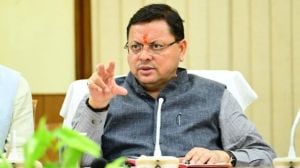A division Bench of Justice Gautam S Patel and Justice Gauri V Godse asked the government to file an affidavit by April 19 detailing the factual background for framing the Rules, and the reasons for it, and posted the matter for hearing on April 21.

Why has Kamra moved the High Court against the Centre?
Kamra has pleaded that he is a comedian, and his comedy is primarily social and political satire. He has said that he hosts long web shows, on which he discusses various aspects of India’s socio-political landscape with prominent activists, political leaders, journalists, etc.
The petition has sought a stay on the Rules, which it says will cause “grave and irreparable harm, injury and prejudice” to the petitioner and other citizens of India.
What are the 2023 amended IT Rules in question?
On April 6, the Ministry of Electronics and IT (MeitY) promulgated the 2023 Rules, which amended the Information Technology Rules, 2021, and allowed the Ministry to appoint the fact-checking unit. Any online content that this fact-checking body marks as “fake or misleading” will have to be taken down by the online intermediaries if they wish to retain their “safe harbour”, which is the legal immunity they enjoy against third-party content.
Kamra has specifically challenged Rule 3(1)(II)(A) and (C) of the Information Technology (Intermediary Guidelines and Digital Media Ethics Code) Amendment Rules, 2023 which deals with the appointment of the “fact checking unit”.
The new Rules were notified less than three months after the Ministry proposed in mid-January that any piece of news that has been identified as “fake” by the fact-checking unit of the Press Information Bureau (PIB), the Centre’s nodal agency to provide news updates, will not be allowed on online intermediaries. The notification of April 6 does not contain the reference to PIB.
Story continues below this ad
What is the basis for the challenge mounted by Kamra?
Through his counsel, Senior Advocate Navroz Seervai, Kamra has submitted that the said Rules would in effect amend Rules 3(1)(a) and 3(1)(b)(v) of the IT Rules, 2021, which would be a violation of several judgments passed by the Supreme Court earlier, including Shreya Singhal case — considered a landmark judicial pushback against state encroachment on the freedom of speech and expression.
Kamra has also submitted that the Rules in question are violative of Section 79 (exemption from liability of intermediary in certain cases) of the Information Technology Act, 2000, and Articles 14 (equality before law) and 19(1)(a) (freedom of speech and expression) and 19(1)(g) (to practise any profession, or to carry on any occupation, trade or business) of the Constitution, and therefore unconstitutional and void.
The Rules in question do not fall within the scope of reasonable restrictions on freedom of speech provided in Article 19(2) of the Constitution, and the amendments are against the public interest and unreasonable, Kamra has argued.
“They (Impugned Rules) strike at the very rule of law and our democratic polity, as they constitute a direct assault by the respondent authorities on freedom of thought, speech and expression, referred to by the Supreme Court as one of the three pillars of our Constitution,” the petition states.
Story continues below this ad
Seervai has also argued that the said Rules do not abide by the principles of natural justice, as there is no provision for a show-cause notice before taking action against the alleged objectionable content.
In contrast, social media platforms have their own norms where the alleged offender is given notice to explain as to why action should not be taken against him/her and, if the publishing of objectionable content continues, the account is first suspended and later deactivated.
“Some people have their careers on social media platforms. If that protection/safeguard is taken away, their career is finished,” Seervai argued.
The government cannot act as judge and prosecutor in its own cause, the petition has said. It has asked the court to declare the impugned Rules as unconstitutional and, pending the hearing of his plea, restrain the Centre from implementing them.
Story continues below this ad
What Bombay HC order has Kamra cited in favour of his argument?
To bolster his claims and to impress upon the court the necessity of its intervention, Kamra has referred to an August 14, 2021 order of the Bombay High Court, in which a Bench led by then Chief Justice Dipankar Datta (who is now a judge of the Supreme Court), had stayed two clauses of Rule 9 of the Information Technology (Guidelines for Intermediaries and Digital Media Ethics Code) Rules, 2021, calling “the indeterminate and wide terms” prima facie against the right to freedom of speech enshrined in the Constitution, and going beyond the “substantive law of IT Act”.
Rule 9 of the IT Rules, 2021 relates to the Observance and Adherence to Code of Ethics to be followed by the publishers, and prescribes a grievance redressal mechanism.
Clause 9(1) of the Rules provides that a publisher shall observe and adhere to the code of ethics under the Rules, while Clause 9(3) provides for a three-tier structure for adherence to the code of ethics, which includes self-regulation by publishers, self-regulation by self-regulating bodies of the publishers, and an oversight mechanism by the central government.
“A division Bench of HC in 2021 had found no difficulty in staying Rule 9 as it was obnoxious. The impugned 2023 Rules strike at the heart. These Rules have a chilling effect and are enough to chill people. After the publication of this notification, my client is liable to the fact-checking committee. He will not have any say when the Rule is retrospectively applied,” Seervai argued.
Story continues below this ad
And what has the Centre’s lawyer argued?
Additional Solicitor General Anil Singh representing the Centre opposed the prayer for interim stay on the impugned Rules. He submitted there will be a separate notification regarding the ‘Fact Checking Unit’, and there was, therefore, no urgency to hear the plea.








































